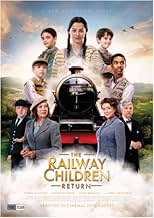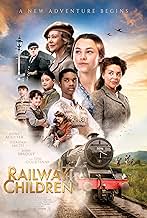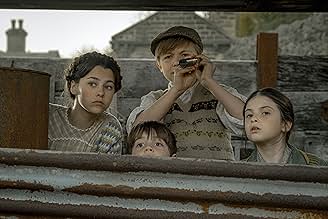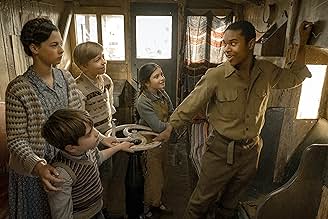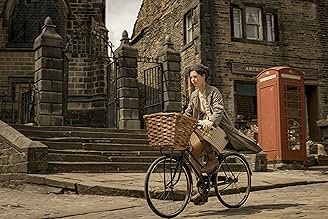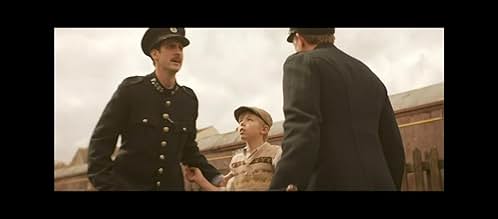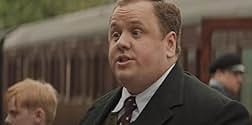CALIFICACIÓN DE IMDb
5.5/10
1.7 k
TU CALIFICACIÓN
Agrega una trama en tu idiomaFollow a group of children who are evacuated to a Yorkshire village during the Second World War, where they encounter a young soldier who, like them, is far away from home.Follow a group of children who are evacuated to a Yorkshire village during the Second World War, where they encounter a young soldier who, like them, is far away from home.Follow a group of children who are evacuated to a Yorkshire village during the Second World War, where they encounter a young soldier who, like them, is far away from home.
- Dirección
- Guionistas
- Elenco
- Premios
- 1 nominación en total
Liam Dillon
- Amercian Officer
- (as Liam Dhillon)
Micky Williams
- Children's Dad
- (as Mickey Williams)
Opiniones destacadas
Having seen the original Railway Children numerous times since it was first released in 1970, I had high hopes for this film, on the basis that Jenny Agutter had agreed to appear in it. However, I was sorely disappointed, as historical inaccuracies and retrospective applied politically correct ideas totally ruined the film for me. To give just a few examples:
The film is based on children being evacuated from Manchester in 1944 in response to a renewed German bombing offensive. While such an offensive did occur (and was known as the Baby Blitz) it was largely concentrated on London and the south east of England.
Bobbie's grandson, Thomas, had a far too broad Yorkshire accent for someone from a middle-class family.
Lily would not have been detained for a prolonged period by the American MPs, but would have been handed over to the British police at the earliest opportunity.
The British policemen would have been wearing helmets and not flat caps.
Lily seeking to hide Abe's army uniform by giving him civilian clothes is completely ludicrous, as he would have been immediately identifiable by his skin colour (or perhaps color).
A young man with Down's syndrome would not have been employed as a telegraph boy at that time.
The American general at the end of the film would not have been black.
The film is based on children being evacuated from Manchester in 1944 in response to a renewed German bombing offensive. While such an offensive did occur (and was known as the Baby Blitz) it was largely concentrated on London and the south east of England.
Bobbie's grandson, Thomas, had a far too broad Yorkshire accent for someone from a middle-class family.
Lily would not have been detained for a prolonged period by the American MPs, but would have been handed over to the British police at the earliest opportunity.
The British policemen would have been wearing helmets and not flat caps.
Lily seeking to hide Abe's army uniform by giving him civilian clothes is completely ludicrous, as he would have been immediately identifiable by his skin colour (or perhaps color).
A young man with Down's syndrome would not have been employed as a telegraph boy at that time.
The American general at the end of the film would not have been black.
As you might expect from an attempt to re run a beloved classic there is a certain air of somewhat cynical box checking about The Railway Children Return but some charm does manage to sneak through.
This time round children are sent to the country to escape the blitz rather than just having to slum it with the yokels because daddy has legal problems. This set up allows Jenny Agutter to return as the grown up matriarch of a family taking in the new generation of railway kids. She seems to be enjoying herself but doesn't really have much to do. This is the same for most of the adult characters in the film, thinly drawn but likeable (apart from one insufferable old uncle who turns up purely to spout ra ra nonsense).
This makes sense as it is the railway "children" after all. Some of the child acting is, to be kind, a mixed bag but it never derails proceedings and there is only so much a young actor can do with insightful lines like, "I hate war, I hate it!"
The plot, such as it is, involves a runaway soldier and institutional racism. Fortunately, only the American military are racist (although they still promote black soldiers far up the ranks so i guess we are meant to think they aren't all bad) as the citizens of a quant English village would never indulge in such behaviour. To call the events of the movie a plot is actually a bit of stretch, things happen for a while and then just sort of resovle themselves without much explanation of how everynody came together.
The Railway Children Return isnt a complete waste of time but is likely to be quickly forgotten. Probably as soon as the credits roll.
This time round children are sent to the country to escape the blitz rather than just having to slum it with the yokels because daddy has legal problems. This set up allows Jenny Agutter to return as the grown up matriarch of a family taking in the new generation of railway kids. She seems to be enjoying herself but doesn't really have much to do. This is the same for most of the adult characters in the film, thinly drawn but likeable (apart from one insufferable old uncle who turns up purely to spout ra ra nonsense).
This makes sense as it is the railway "children" after all. Some of the child acting is, to be kind, a mixed bag but it never derails proceedings and there is only so much a young actor can do with insightful lines like, "I hate war, I hate it!"
The plot, such as it is, involves a runaway soldier and institutional racism. Fortunately, only the American military are racist (although they still promote black soldiers far up the ranks so i guess we are meant to think they aren't all bad) as the citizens of a quant English village would never indulge in such behaviour. To call the events of the movie a plot is actually a bit of stretch, things happen for a while and then just sort of resovle themselves without much explanation of how everynody came together.
The Railway Children Return isnt a complete waste of time but is likely to be quickly forgotten. Probably as soon as the credits roll.
There is nothing inherently wrong with this film, it is very sweet, quaint and positively intoxicating with its timeless charm of trains in the Yorkshire countryside. But the audience need something more to keep The film from being boring; it is simply not enough to recycle the same locations and the same plot points because from very early on this film just becomes a predictable tribute to the superior 1970s version.
An interesting point to note is how everyone from film critics to members of the public have complained about the secondary theme regarding racial inequality. Nobody was expecting nor wanted this theme in the film and subsequently it is quite jarring and feels out of place according to many people. I for one argue that in order for a period film to be successful nowadays it has to carry social related issues such as racial inequality in order for it to be able to relate to the wider public. After all, we are now so much more aware of racial related issues, ignoring it is hard to do.
In spite of the beautiful shots there was a really terrible continuity errors that were next to unforgivable and the hammy acting. Of the children left much to be desired when it came down to the casting director's choices.
This film will mostly have a fondness towards it, but it's destined to be consigned to TV as a Sunday afternoon filler.
An interesting point to note is how everyone from film critics to members of the public have complained about the secondary theme regarding racial inequality. Nobody was expecting nor wanted this theme in the film and subsequently it is quite jarring and feels out of place according to many people. I for one argue that in order for a period film to be successful nowadays it has to carry social related issues such as racial inequality in order for it to be able to relate to the wider public. After all, we are now so much more aware of racial related issues, ignoring it is hard to do.
In spite of the beautiful shots there was a really terrible continuity errors that were next to unforgivable and the hammy acting. Of the children left much to be desired when it came down to the casting director's choices.
This film will mostly have a fondness towards it, but it's destined to be consigned to TV as a Sunday afternoon filler.
It was a good idea to update the railway children story of the Second World War but an absolutely dumb idea to put modern ideas of racism - presumably to please the woke crowd - into it. Come on this is a children's film. We know that racism existed in the American army but the enemy was not the Americans but the Nazis. Even the murderous Joe Stalin was on our side! The idiots who rewrite history like this give our children the wrong idea, that somehow the brave lads who went to war against one of the most murderous regimes ever were the bad guys. These things are just totally annoying and totally out of place in children's films. Another example of woke virtue signalling. The movie could've been made a lot more entertaining with a lot better and more imaginative screenplay. Hopeless!
Where to start :
Good points : none
Pointless sequel, yet another example of the talentless chimps beating on keyboards to produce an awful script for a shameless money making grab on the back of a classic
I hope they paid Jenny Agutter a lot of money for her short appearances.
Absolute rubbish, full of 'woke' B. S.
If you have fond memories of the classic original don't waste your money.
Good points : none
Pointless sequel, yet another example of the talentless chimps beating on keyboards to produce an awful script for a shameless money making grab on the back of a classic
I hope they paid Jenny Agutter a lot of money for her short appearances.
Absolute rubbish, full of 'woke' B. S.
If you have fond memories of the classic original don't waste your money.
¿Sabías que…?
- TriviaUtilises the same Yorkshire locations as the 1970 film this story follows.
- ErroresThe blackout did not appear to be in force in Oakworth. In many scenes, from Lily climbing out of the window and running down the field with a torch, to front doors being opened in a blaze of light, there was no indication that a blackout was in force at all.
Blackout regulations started on 1st September 1939 and ended in May 1945. Rules were relaxed slightly in September 1944, but only to allow very low levels of lighting, no brighter than moonlight.
Lily's torch would have been pasted over with dark paper to dim the beam, or black paper with a slit in it.
Selecciones populares
Inicia sesión para calificar y agrega a la lista de videos para obtener recomendaciones personalizadas
- How long is The Railway Children Return?Con tecnología de Alexa
Detalles
- Fecha de lanzamiento
- Países de origen
- Sitio oficial
- Idioma
- También se conoce como
- Railway Children
- Locaciones de filmación
- Productoras
- Ver más créditos de la compañía en IMDbPro
Taquilla
- Total en EE. UU. y Canadá
- USD 466,391
- Fin de semana de estreno en EE. UU. y Canadá
- USD 245,904
- 25 sep 2022
- Total a nivel mundial
- USD 4,298,731
- Tiempo de ejecución1 hora 39 minutos
- Color
- Relación de aspecto
- 2.35 : 1
Contribuir a esta página
Sugiere una edición o agrega el contenido que falta







